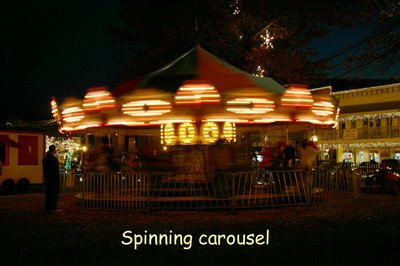Don't be spun by false teachers!
 While it is O.K. to be spun on a carousel, it is not good to allow false teachers to spin scared Biblical text......
While it is O.K. to be spun on a carousel, it is not good to allow false teachers to spin scared Biblical text......
Therefore, we should be careful that the exegesis we accept for a Scriptural text is based on a solid hermeneutics. This takes knowledge, wisdom, and most of all discernment.
Hermeneutics: The theory and methodology of interpretation, especially of scriptural text.
Exegesis: Critical explanation or analysis, especially of a text.
Spin: A distinctive point of view, emphasis, or interpretation.


9 comments:
How does one determine the nature of "solid hermeneutics?" After all, I suspect that few biblical interpreters would openly advocate that their hermeneutical methods are "shaky." So then, what is the criterion for determining what is "solid" and what is not?
Exist....
Good point and I am not qualified to make an expert judgement on what is solid. However, this is why I mentioned knowledge, wisdom, and discernment. I meant to also list prayer, but when I had to redo the post due to an error it got left out.
I have over the last few months watched free grace advocates deny clear teaching of Scripture by going to extreme lengths to refute the obvious when it does not agree with their theology. At the same time when a single verse appears to support their theology, they read this theology into the verse and criticize any attempt to reconcile the verse to the whole of Scripture.
There are obviously many things to look at but I thing even someone untrained can spot faulty hereneutical methods if they use the basic principles I mentioned.
Jazzycat
jazzy--
Thanks for the response.
Good point and I am not qualified to make an expert judgement on what is solid. However, this is why I mentioned knowledge, wisdom, and discernment. I meant to also list prayer, but when I had to redo the post due to an error it got left out.
I understand your point, but I still wonder about how these various criterion are defined. After all, people like myself truly believe ourselves to be engaging the Scriptures with these very things--yet people who do agree with our conclusions (such as yourself), often do not believe that we have used "knowledge, wisdom and discernment" in our interpretation of Scripture (and vice versa). Therefore, how do we determine who is really discerning and who is self-deluding? I would suspect the answer is not as easy as either of us would want.
I have over the last few months watched free grace advocates deny clear teaching of Scripture by going to extreme lengths to refute the obvious when it does not agree with their theology.
Again, who defines what the "clear" teaching of Scripture is? As I noted above, what is clear to you is perfect mud to others who approach with different theological presuppositions. Therefore, this clearly illustrates that the issue is explicitly related to how one approaches the text, and not the nature of the text itself. And again, those who do not approach the Scriptures through Calvinistic hermeneutical suppositions believe that Calvinists do the exact same thing with the Scriptures that you accuse the "free gracers" of doing.
At the same time when a single verse appears to support their theology, they read this theology into the verse and criticize any attempt to reconcile the verse to the whole of Scripture.
Surely you've had this critique leveled against yourself at one time or another...
There are obviously many things to look at but I thing even someone untrained can spot faulty hereneutical methods if they use the basic principles I mentioned.
There is no such thing as an "untrained eye" when it comes to interpretation. Regardless of one's familiarity with the texts, we all come to them with certain presuppositions about what we are reading, what we expect to learn, etc.
Exist...
When there is a major disagreement on interpretation of a passage, ultimately a person must look at the two views and either use his own abilities or accept what someone else says about the passage.
If a person is going to make the call, then the more prayer, knowledge, wisdom, discernment he can bring, the better chance he will have of having a right interpretation. If he is going to rely or be influenced by how someone else interprets the passage, then once again the more knowledge, wisdom, discernment, etc. he uses to judge this person's qualifications, the better chance he will have in getting it right. That is all I am saying here.
For example, a person could adopt orthodox Christianity and be influenced by the many great theologians of the past and present, or choose to believe someone like Jim Jones, David Koresh, Joeseph Smith, or Muhammand.
Please check my July 5 and July 7 posts for two examples.
Jazzycat
Jazzy--
According to your last response, are you then admitting that "sola Scriptura" is not sufficient? This would seem to be the proper conclusion as you note the importance of framing interpretation within the complex of orthodox thought, which is precisely the view of the RC and Orthdox churches in regards to the dual and unified role of Scripture and tradition as the regula fidei.
Exist....
Perhaps I should have added the word protestant between orthodox and Christianity. A central tenet would be 'sola Scriptura'.
Example for this post:
James 2:14-26 is a devastating text to core free grace theology. They have thus asserted that the dead faith James is speaking of is a saving faith. Anyone using knowledge, wisdom, and discernment will probably come to the conclusion that James is not referring to a saving faith in this passage. If there is any doubt, then a check of the leading commentaries will offer the same conclusion.
This is my point and we shouldn't get bogged down in what the meaning of is, is!
Jazzycat
Two things?
one)
Please define exactly what you mean by free grace?
two)
“When there is a major disagreement on interpretation of a passage, ultimately a person must look at the two views and either use his own abilities or accept what someone else says about the passage.”
“If a person is going to make the call, then the more prayer, knowledge, wisdom, discernment he can bring, the better chance he will have of having a right interpretation. If he is going to rely or be influenced by how someone else interprets the passage, then once again the more knowledge, wisdom, discernment, etc. he uses to judge this person's qualifications, the better chance he will have in getting it right. That is all I am saying here.”
I hope that somewhere between knowledge, wisdom, discernment, and etcetera, you either include or have space for the “character of God;” something we can know; something he wants us to know. Not everyone has the same level of the gift of discernment, but all of us can have a knowledge of the character of God, the first test that ought to be employed, and probably is in considering the words and actions of another person.
For a long time, many who espouse the interpretation of Election in the Doctrines of Grace, believed that babies who were not part of the elect went to hell. That viewpoint was a logical extension of the doctrine of election, but somewhere along the way, somebody concluded, correctly in my opinion, that such a viewpoint was inconsistent with the “character of God” and that all babies who die go to heaven. There haven’t been any more scriptures discovered prior to that decision, in fact the Bible does not directly speak to that subject. But creating innocent babies so they can be doomed to hell, seemed out of sync with the “character of God.” There is a conundrum created here that you will be pleased to know I will not address.
Jerry,
Thanks for your visit.
You asked..... one)Please define exactly what you mean by free grace?
There is a system of theology that I and many others have debated over at the Unashamed of Grace blog (where I saw your comment) and elsewhere known as 'free grace'. Zane Hodges and Bob Wilkin are the leaders of the movement. They are extremely anti-calvinistic as their strongest opposition comes from that direction. They are very knownledgeable and excellent at constructing straw dogs especially Calvinistic straw dogs.
They affirm that a person that makes a passive mental profession of faith is eternally saved regardless of how he lives. In their view such a person could profess Christ and then become a lifelong atheist the next day yet would be eternally saved. I would hold that such a person had given a false profession.
For example: They have debated on these blogs that the dead faith James speaks of in James 2:14-26 is a saving faith. They hold that three of the four soils in the parable of the soils produced Christians and only the seed that fell on the hard pathway failed to produce a Christian. I and most orthodox Christians would affirm that only the seed that fell on the good soil produced a Christian.
My posts of June 30, July 2, 5, & 7 deal with refuting their theology. They label my denonination, PCA Presbyterian, and Southern Baptists among many others as affirming a lordship salvation that requires works for justification. This of course is absurd as our view would be grace alone, through faith alone in Christ alone. We do affirm that action or works will naturally flow from a truly born again heart due to the power of God's regeneration. These works are a result of justification and in no way have any merit toward justification.
I will address your second point in a separate comment.
Jazzycat
Jerry,
In addressing your second question about election, I would like to state up front that I personally believe that all babies that die receive God's grace and salvation. I also believe in unconditional election.
I agree with your thesis up to a point about considering the 'character of God'. I agree if you mean that you use the entire Holy Bible as your source for determining the character of God. However, many people today use their imagination (see my Photo Meditation #22) or a pick and choose buffet style approach to constructing the characteristics of a God they like and can live with. This is unbiblical and dangerous. I am sure you have heard someone say, "My God would never.....". This kind of approach of using the imagination is why we have major Christian denominations that endorse homosexual marriage, abortion, etc.
I believe all the characteristics of God reveal a Holy, awesome, loving God of justice and mercy (see Photo Meditation # 19).
Jazzycat
Post a Comment